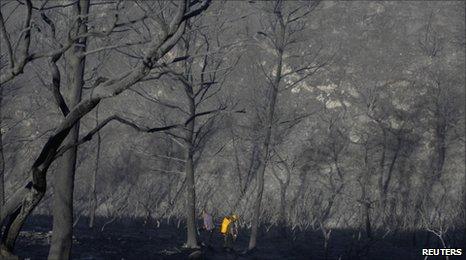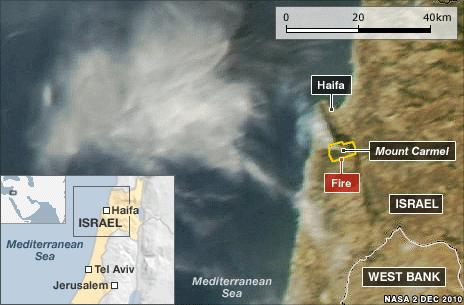Israel faces flak for response to forest fire
- Published

The blaze has already devastated more than 10,000 acres (4,047ha) of land
Even as the massive fire still rages in the north of Israel, national media have wasted no time in criticising what they see as the inadequate response of the state.
They take a dim view of the role played by a number of officials, including the minister of the interior, who has been forced to fend off their claims.
A commentator in the Maariv , externaldaily, Ben Caspit, puts it crudely, observing that Israel has been caught "standing before the flames, with its pants down".
While the government prioritises security and defence, Mr Caspit shares the general opinion that it was not ready to deal with a disaster that was long predicted.
He notes that this is "a country above which hover spy satellites, a country to which foreign sources attribute chilling military operations around the globe, a country that plans to attack the nuclear infrastructure of a distant regional power".
Yet, he adds, it "is also the country that has its firefighting material run out after seven hours, a country whose fire trucks date back to the previous century".
'Helplessness'
Writing in Haaretz, external, Aluf Benn describes the disaster as "the firefighters' Yom Kippur War" - comparing it to the dark day in Israeli history when its military intelligence failed to spot that Egypt and Syria had massed troops on the border.
He suggests the Israeli fire and rescue services "were not prepared to counter a disaster of such a magnitude" and furthermore that "Israel is not prepared for war or a mass terrorist strike that would cause many casualties in the home front".
"Under such circumstances, it is best for Israel not to embark on war against Iran, which will involve thousands of missiles being fired on the home front," Mr Benn concludes.
Although the fire is thought to have started in an illegal landfill in the Carmel mountains, an editorial in Yedioth Ahronoth, external reflects on how an attack on Israel's northern border by Iran's ally - the Lebanese militant and political group Hezbollah - could have produced an even worse effect.
"Imagine that a salvo or rockets landed in the Carmel yesterday, in Gush Dan or Galilee and caused fire storms in five different centres. In what state would the country have been then?" asks Alex Fishman.
"Yesterday's catastrophe is only an example of the helplessness from which the emergency set-up of the state of Israel suffers. The shaky link in it is the firefighting set-up."
Prayers for rain
The urgent appeal for international help from Prime Minister Benjamin Netanyahu is seen as embarrassing by many.

It is widely reported that Israel had no firefighting planes at its disposal and has just 1,400 firefighters, much lower than the international average.
With some satellite stations and newspapers going on to point fingers of blame at the minister for the interior and head of the Shas party, Eliyahu Yishai, his spokesman leapt to his defence.
"Eighteen months ago at the beginning of this government, the interior minister wrote a letter to the prime minister and the minister of finance asking for 500m shekels (£88m; $138m) for the fire unit," Roi Lakhmanovich told the BBC.
"He didn't get any answer. Three months ago we got just 70m shekels."
As medical sources confirmed 41 people had died, he passed on the minister's condolences, saying "we are very, very, very sorry about that".
A criminal investigation which could check whether any officials were negligent is now expected in days.
Concerns had been growing in the media about the potential effects of the unusually warm, dry conditions that ultimately caused the blaze in Galilee to spread.
This week, it was widely reported that rabbis had organised prayers at the Western Wall in Jerusalem to ask for rain.
- Published3 December 2010